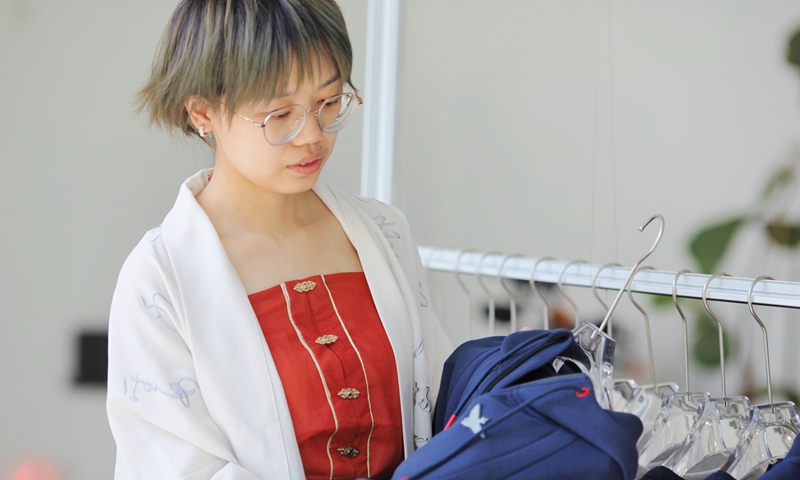http://1253985869.vod2.myqcloud.com/ee20c49fvodtransgzp1253985869/54591bcc387702300148005698/v.f100040.mp4

Sailors in the fashion clothing pose in front of the aircraft carrier Shandong for the street style photos. Photo: Courtesy of Glory Made
Editor's note:
China's first white paper published recently on its youth describes its young generation as "confident, aspirant and responsible". According to the document, Chinese youth possess a global vision and stand at the forefront of the times bursting with commitment: pursuing lofty ideals with a firm belief in socialism with Chinese characteristics. Young people are also described in the paper as full of patriotism, displaying the sterling quality of living up to responsibilities and striving to be contributors to the country's development.
Wednesday marks the national Youth Day, which falls on May 4 to honor the patriotic youth movement - the 1919 May Fourth Movement that began 103 years ago. On this special occasion which also marks the 100th anniversary of the founding of the Communist Youth League of China, the Global Times presents a series of stories about four prominent figures of the young generation, who were nourished in great times with ample opportunities and have been sparing no efforts in promoting Guochao, also known as Chinese trends or "China chic", to the international stage. Looking ahead to the new era, their stories fully showcase that youth is the most active and vital force in society and the hopes of a country and the future of a nation lie in their hands. This is the second part in the series in which we can get to see these young faces, a young designer who is helping popularize China's aircraft carrier culture centering the Shandong vessel.The rest stories are Gen-Z director amazes world with ancient dancing show, pledges to be cultural promoter, and Young Chinese culture promoter presents traditional handicrafts to Oxford Uni and Milan Fashion Week.
It was April 23, the PLA Navy Day in China, and 24-year-old Tang Ziwei was even busier. The designer behind the fashion line of the Shandong, China's first domestically designed and built aircraft carrier, had to catch up for new products to meet the enthusiasm among young people for China's own fast developing naval culture.
"Not only the whole team including me but also thousands of China's navy fans are so excited about the day, when we can cheer for China's navy," the 1998-born Tang told the Global Times. "What's more, I feel even prouder to part of it, being able to contribute to the country's own navy culture with my talent and the understanding of China's culture".
Three years after the Shandong vesselwas launchedin 2017, the Glory Made, the studio that Tang works at, released the first culture products for the ship from baseball cap hats to toy models. "It turned out to be a great success among young public, who show great interest in the Shandong vessel and our navy," recalled Xie dahuan, who runs the studio. "All sold out. People need to make orders first and wait for weeks before receiving them."

Sailors in the fashion clothing pose in front of the aircraft carrier Shandong for the street style photos. Photo: Courtesy of Glory Made
Passion for PLA Navy
The passion and pride for China's own homemade aircraft carrier influence ordinary people who are willing to get close to it, but also the designers like Tang who make it their own dream to getting more people fall in love with China's own naval culture.
In order to achieve that goal, the Glory Made released the fashion clothing line in the summer of 2021, which includes T-shirts, jackets, shorts and even the popular flight jackets full of China's own design languages and culture elements.
"You see the logo that we designed, the Chinese characters as well as the pandas graphic designs ... they are unique and represent our young people's cultural confidence," said Tang, who visited the Shandong ship for inspiration only months after joining the studio.
Having been fully prepared to see such a large ship, 300 meters at length and over 20 floors tall, she was still stunned to stand in front of the 75,000-ton sea giant. "It is too spectacular. Words can't even express my feelings that time: pride, excitement, joy and more," she recalled.
Claiming she wasn't a military fan herself, the young girl fell in love with the ship after the trip. "Stepping on the ship and talking with these young people, soldiers, pilots, most at my age, help me make up the mind to introduce to more people with the pride feeling, passion and positive energy that I learned from them and experienced myself," she said. Even her PC's wallpaper is a picture of the Shandong vessel.

Photo: Designer Tang Ziwei
Chinese aesthetic culture
How to make young people be attracted to these cultural products has been something that Tang and her colleagues started to plan from the very beginning. Every detail has been carefully added with China's elements like propitious clouds embroidery on the baseball cap.
To Tang, create things with Guochao or China chic style is the reason why she started. "Staying true to my original heart means that I need to apply these inspirations that our own culture brings and show the cultural confidence that wearing these
products can bring," she said. Tang hopes to spread traditional culture among her peers especially those born after 1995.
As one of them,
Tang knows better than anyone else. "We are growing up during the country's fast developing period and witnessing the strength of China. So we are eager to tell the world about our sincere patriotic feelings and cultural pride."
Clothing is the best carrier of that cultural onfidence. In Tang's designs, the name of the Shandong ship in Chinese characters is embroidered on the front of their most popular flight jacket, bring a feeling of "fancy and high class"; "Serve the People," the Chinese writing of the Communist Party of China's motto is also attached on several styles of T-shirts that both young people and sailors on the Shandong ship love to wear.
A series of street-style photo shoots that the sailors and pilots in these clothes posed in front of the ship has been widely covered by both Chinese media outlets and overseas ones like CNN.
According to Tang, the T-shirts imprinted with the image of a robot panda are also popular with young sailors due to the design which they find cool, half of the lovely beast in the suit of a jet pilot and the other half in the X-rayed mechanical structure while its claws being boosted with jets.
Besides, due to the safety requirement on the ship, these sailors have to wear clothes made of pure cotton in some occasions. "Xinjiang cotton, one of the best in the world has been wildly used on the whole clothing line. It feels soft and comfortable," she added.
From the raw material and designs, Tang and her colleagues are choosing the best of the best of the Shandong cultural products. "Young people like me, who refuse the idea of tangping (lying flat), are working in every area to let the world see the strength of Chinese people, the power of Chinese design and feel the warmth of Chinese culture," Tang said.








